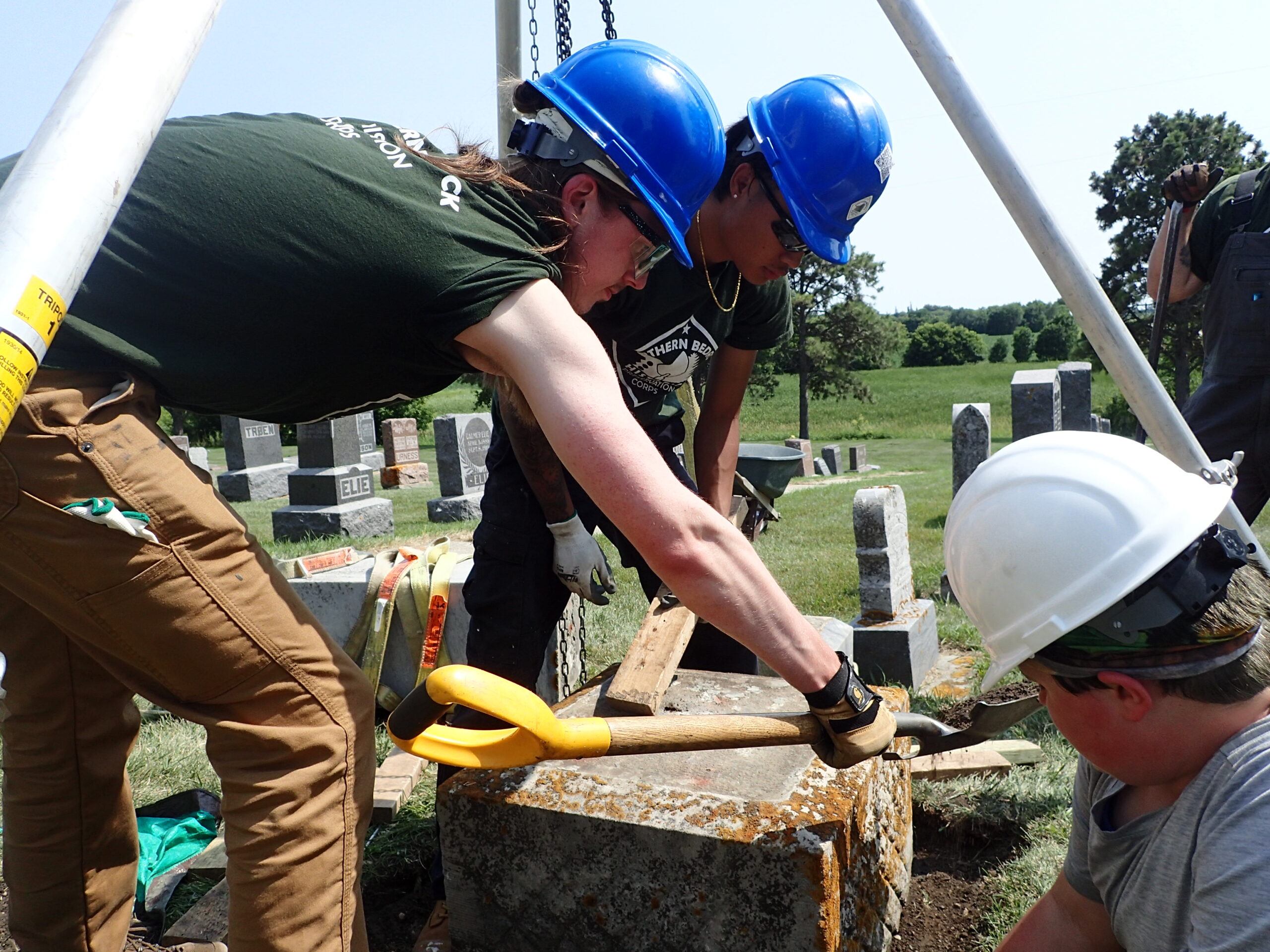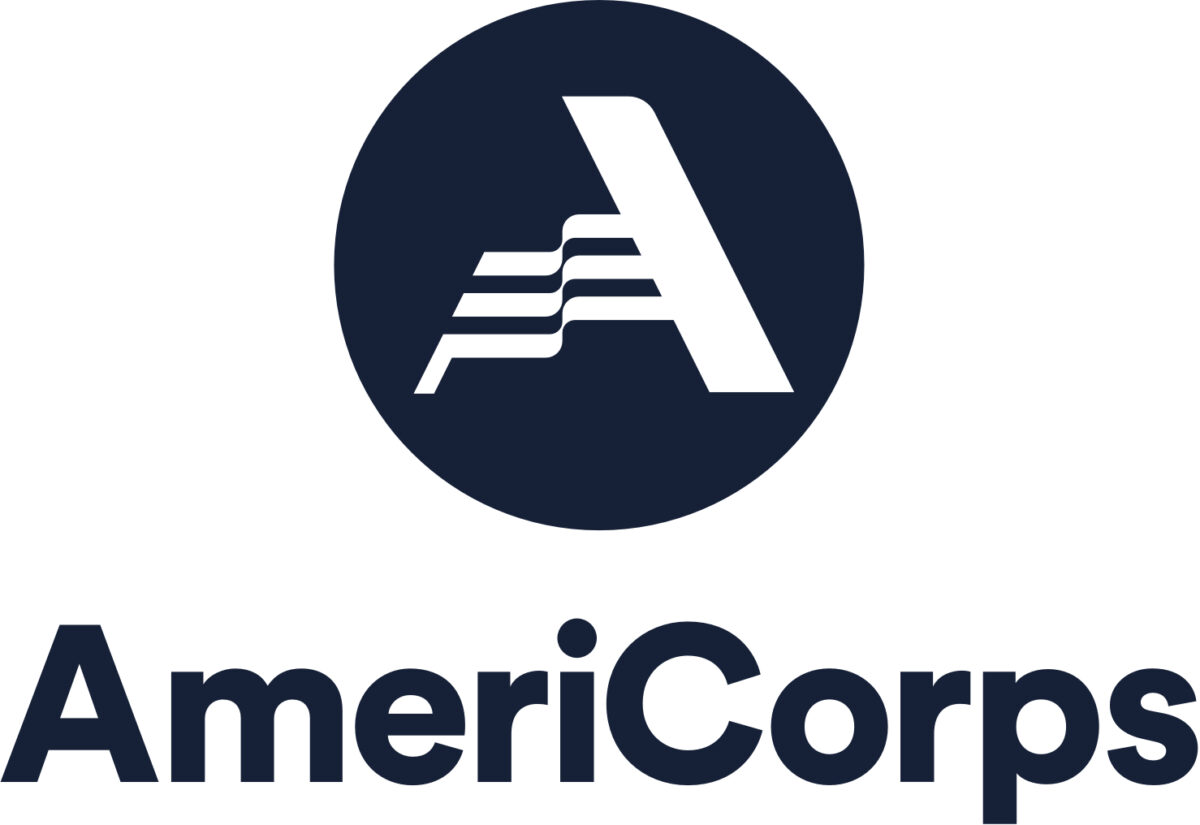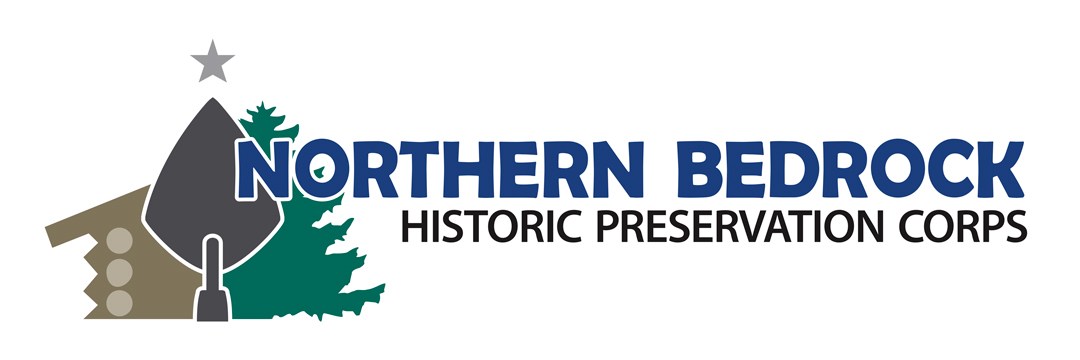
“Project host” refers to the individual(s) who manage the site that each crew serves. Northern Bedrock wouldn’t be able to function without project hosts. Each host provides vital skills to collaborate with Crew Leaders and Corpsmembers alike. Projects may include site stabilization, window repair and reglazing, masonry, plasterwork, log building maintenance, and cemetery restoration. Our crews reflect a diversity of backgrounds and are carefully recruited based on their interest in the field and their ability to be successful. As a Project Host, you will be a vital part of the Northern Bedrock mission by providing an opportunity for our Corpsmembers to get hands-on preservation trades experience while also sharing knowledge of the site and of the industry as a whole.
The Basics
- Crews are available June through October
- Crews serve seven full days (plus travel and equipment maintenance time)
- Each crew comes equipped with a fully-stocked tool trailer; specific project materials are generally provided by the Project Host.
- Crews serve and camp in just about all conditions, rain or shine
Your Role
- Communicate with staff, technical Instructor(s), and crew leader to coordinate the scope of work
- Provide insight on area resources, including additional technical specialists that can be of help
- Be available to oversee the entire duration of the project, should any questions arise
- Provide context for the work to be done by introducing the crew to the site and to the significance of the project
Expectations
- Obtain in advance all necessary approvals, including from the State Historic Preservation Office (SHPO) and local governments, if needed
- Provide on-site or nearby camping accommodations for the crew
- Pay a fee-for-service based on project length; cost-sharing opportunities with Northern Bedrock may be available.
Thank you for partnering with us to build pathways to the preservation trades for the next generation!
Frequently Asked Questions (FAQs)
How do I request a crew?
We have a Project Inquiry Form on our website: Project Inquiry Form
You can also get in touch with a staff person directly by emailing program@northernbedrockcorps.org
What kind of projects do you do?
We take on all kinds of restoration projects on historic buildings/landscapes/features outside of electrical, plumbing, or structurally integral fixes. Here is a list of our most common projects:
– Cemetery restoration – cleaning, edging, resetting, leveling and repairing headstones
– Window restoration – replacing glass, re-glazing, scraping and finishing
– Log building care –chinking and daubing, maintenance, and log replacement
– Masonry – tuckpointing, brick infill, rebuilding and repairing stone walls
– General maintenance, carpentry, and repair
– Scraping and painting / staining structures (interior and exterior)
– Constructing steps, decks, shutters, railings and more
– Replacing and repairing roofs (rolled and shingle)
– Plaster repair and replacement
– Fence repair and replacement
What is the crew’s schedule?
Our crews serve in a set 9-day “hitch” schedule starting on Tuesdays and ending on the following Wednesday. Our office is based in Duluth, MN, which is a long drive away from many of our projects. For this reason, our crews utilize the first and last day of the hitch to travel, set up, and take down.
Their days begin at 8:00 am at their campsite and end at 5:30 pm at the worksite. Our crews serve based on hours rather than tasks completed as part of their AmeriCorps requirements. Typically, a crew serves between 300-400 hours on the project site.
How many hours do crews serve?
300 – 400 hours.
Corpsmembers typically serve between 85 – 90 hours per hitch. However, not all of those hours are directly served at the project site. The first and last days are mostly spent traveling from our Duluth office to the project site, getting set up, or taking down. Corpsmembers also receive an hour of “hitch support” each day to address the time spent cooking, cleaning, and tending to their spike camp. Other variables include the number of Corpsmembers at each site, which typically is between 4-6.
What does a Project Host need to provide?
Project Hosts supply consumable materials, a water source at their campsite, bathrooms or port-o-pottys at the worksite and campsite, identified storm shelters at both the worksite and campsite, and camping accommodations (does not need to be a traditional campground). Our staff will work with you to help determine the correct type and amount of consumables.
Where do the Corpsmembers stay while they’re on hitch?
Corpsmembers tent camp while on hitch! We try to schedule projects with indoor accommodations during the colder months of our field season (September and October). Camping arrangements are typically made by the Project Hosts, though our staff is happy to help scout suitable accommodations in your area.
Things that are required at their campsite:
A bathroom/port-a-potty
A water source (can be a water tank, or pre-planned water drop-off)
Identified storm shelter
Space to accommodate 4-6 tents
Space to park a van and trailer
Space for their spike kitchen
Things that are nice to have at campsites:
Access to electricity
Shower facilities
Running water
Wi-Fi
Privacy/a quiet space
Access to freezer or fridge space
Indoor accommodations are always appreciated if you have access to an indoor space!
Where is Northern Bedrock located, and where can crews serve?
Northern Bedrock is based out of Duluth, MN. All projects start and end at our office; however, our crews are fully mobile and can serve at historic sites all around Minnesota and out-of-state projects, barring they are within a 6-hour drive from Duluth, MN.
What do Corpsmembers receive training on?
All Corpsmembers undergo a Classroom Orientation and a Project Orientation hitch to understand the concepts of preservation and basic carpentry. For more site-specific skills, Corpsmembers are joined by a Technical Instructor to learn on-site throughout the hitch.
During Classroom Orientation, crews receive certificates in OSHA 10 and First Aid and CPR, and training on canoe and water safety, driving and trailering, tool name and identification, introduction to historic preservation, AmeriCorps policies, project management (documentation, time management, customer service, site safety, etc.), and Leave No Trace.
During Project Orientation, crews rotate through hands-on preservation projects to acquaint them with the basics. Typically, they receive training in window restoration, cemetery preservation, and general carpentry, including operating power tools and hand tools.
Crew Leaders partake in an additional Leadership Orientation where they receive Lead Renovator certification, training in Northern Bedrock and AmeriCorps policies, conflict resolution, NPS Preservation Briefs, and hands-on preservation projects.
How much does it cost to host a crew?
For projects based in Minnesota, we charge a flat rate of $12,000. For projects outside of Minnesota, we charge a flat rate of $15,000. Additionally, Project Hosts supply the consumable materials needed for the projects (shingles, mortar, lumber, etc.) and camping accommodations for the crew while they are on hitch.
With that, Project Hosts receive 300 – 400 service hours on their projects, a fully stocked tool trailer, Technical Instructors for projects that need them at no additional cost, optional public workshops, and the opportunity to connect with emerging professionals who could go on to work for you!
Will a member of Northern Bedrock staff be with the crew?
Typically, no. Some members of our staff will act as Technical Instructors for certain projects, stop in to address tool needs or conduct safety checks, but our crews are generally independent. We hold weekly conference calls between staff and Crew Leaders to check in on progress or address unanticipated situations, as well as operate a 24-7 on-call phone, which crews can contact at any point to get in touch with our staff. Crew Leaders are trained on how to effectively communicate with Project Hosts, Technical Instructors, our staff, and their crew members and act as intermediaries in the field.
What are Education Hours?
Education Hours are “the hours spent in training and preparation for service to the community”, as defined by AmeriCorps. Corpsmembers can take advantage of educational opportunities in the area during hitches in the event of poor weather or early completion of the project. Education Hours cannot exceed 20% of their total service hours. “On-the-job” training is considered direct service and does not contribute towards Education Hours.
What if it rains the whole time our crew is supposed to be serving?
While we try to factor in weather conditions while project planning, we can’t guarantee the weather will cooperate. Project Hosts should have secondary projects that can be completed indoors or during rainy weather if the primary project requires clear weather. As an AmeriCorps program that operates with volunteer labor for pre-determined periods of time, we cannot guarantee the amount of work Corpsmembers complete.
What do the crews bring with them?
Crews travel in a van and trailer. The tool trailer is equipped with Personal Protective Equipment (PPE), landscaping tools, basic hand tools like scrapers, crowbars, hammers, etc., ladders, wheelbarrows, cleaning supplies, saws, drill kit (power drill, impact driver, drill bit set, batteries, and battery charger), angle grinder, circular saw, sawzall, measuring tools, socket set, a two-burner propane stove, and canopy.
We have additional specialty equipment that we pull from our tool cache based on the type of project (cemetery, log restoration, window kits, etc.). Our staff works with Project Hosts to develop these tool lists based on the goals of the project prior to the start of the hitch. If the project requires additional equipment that we do not have, we ask that our Project Hosts provide said equipment via rental or other means (scissor lifts, additional scaffolding, etc).
Can your crews serve at privately owned worksites?
Generally no. However, in July 2023, AmeriCorps released a set of specific circumstances in which Corps programs could partner with for-profit entities. Some of the most relevant for our services include:
Service Activity #1: Wildfire mitigation on public and/or private lands, including land grants that are part of a plan generated by local, state, or national authorities.
Service Activity #2: Grassland management on public and/or private lands, including land grants that are part of a plan generated by local, state, or national authorities, is an allowable activity.
Service Activity #4: Urban community beautification /neighborhood beautification on public and/or private land owned by businesses.
Service Activity #6: Home weatherization for residents of low-income rental properties.
Additionally, projects that fit the above criterion also need to be part of a pre-existing local plan with the goal of community benefit at the forefront. If you have a project that you think may fit this criterion, please reach out to program@northernbedrockcorps.org.
Building Pathways to the Preservation Trades
Northern Bedrock's mission is to develop enduring workforce and life skills through service learning in historic preservation and community stewardship.
FOLLOW US


